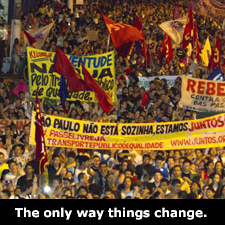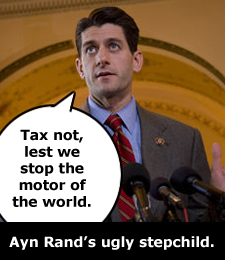While they’re all talking about the Sopranos … let’s talk about something that’s actually happening in the actual world. Like the uprisings in Turkey and in Brazil.
First, the way the U.S. press covers the government response to these protests is interesting, to say the least. I suppose they are so overcome by the loss of James Gandolfini that they have forgotten how harshly our own various municipal police forces cracked down on the Occupy Wall Street movement just eighteen months ago or so. The developing world doesn’t have a corner on repression, not by a long shot.
 Still, it’s interesting that in both cases, the original impetus for the protest was a decision by the government affecting public services. Both Turkey and Brazil have been touted as relatively successful governments, and yet beneath many success stories there is often another story to tell, that of the poor, the working people, those left behind. You can see them in Brazil, in China, in India, in Turkey, just as you can see them here in the United States. True, the standard of living in Brazil has improved vastly over the last decade. But the people protesting increased transit fares are making us aware of the work that is yet to be done.
Still, it’s interesting that in both cases, the original impetus for the protest was a decision by the government affecting public services. Both Turkey and Brazil have been touted as relatively successful governments, and yet beneath many success stories there is often another story to tell, that of the poor, the working people, those left behind. You can see them in Brazil, in China, in India, in Turkey, just as you can see them here in the United States. True, the standard of living in Brazil has improved vastly over the last decade. But the people protesting increased transit fares are making us aware of the work that is yet to be done.
This did not come out of nowhere. The core of the movement in Brazil are organizers who have been working for years towards greater social and economic justice. These activists and the landless peasant movement was substantially responsible for the somewhat more progressive shift of national governments, starting with Lula’s election. (See this article in the New York Times.) I’m sure the same can be said of the people standing in the park in Turkey.
America is no different. Occupy Wall Street didn’t come out of thin air either. It was the next chapter of resistance to a society that rewards criminality on the part of the privileged and protects the powerful from accountability. From Ankara to Sao Paulo to New York, mass movements remain the best way to get our leaders to stop, listen, and act.
Feet on the street – that’s what does it, every time.
luv u,
jp

 John Dewey had it about right when he said that politics is the shadow cast on society by big business. I suppose in his day it wasn’t very different – the wealthy have always pressed their advantage. Perhaps the period from World War II through the 1970s will be seen as unique in American history in the sense that workers had some influence on the economic life of the nation. There was a social contract between the rich and the not-rich that provided the latter with a modest share of the wealth they themselves were creating through their labor. That model has been under attack for decades now, and it is crumbling.
John Dewey had it about right when he said that politics is the shadow cast on society by big business. I suppose in his day it wasn’t very different – the wealthy have always pressed their advantage. Perhaps the period from World War II through the 1970s will be seen as unique in American history in the sense that workers had some influence on the economic life of the nation. There was a social contract between the rich and the not-rich that provided the latter with a modest share of the wealth they themselves were creating through their labor. That model has been under attack for decades now, and it is crumbling. And contrary to what is argued by Ayn Rand acolytes like Paul Ryan and (Ayn) Rand Paul, the wealthy truly do ride on the backs of working people. That has always been the case. Rand imagined the world being brought to a standstill by a wealthy, innovative class of overlords who withhold their beneficent participation in Rand’s dystopian top-down economy. The truth is, they are far more reliant on us than we are on them. Sure, the wealthy can choose to invest their capital in ways that create jobs. But where did that capital come from? How does an industrialist, a banker, an entrepreneur, an oil executive gather all that wealth? Mostly through the under-compensated labor of millions of workers.
And contrary to what is argued by Ayn Rand acolytes like Paul Ryan and (Ayn) Rand Paul, the wealthy truly do ride on the backs of working people. That has always been the case. Rand imagined the world being brought to a standstill by a wealthy, innovative class of overlords who withhold their beneficent participation in Rand’s dystopian top-down economy. The truth is, they are far more reliant on us than we are on them. Sure, the wealthy can choose to invest their capital in ways that create jobs. But where did that capital come from? How does an industrialist, a banker, an entrepreneur, an oil executive gather all that wealth? Mostly through the under-compensated labor of millions of workers.